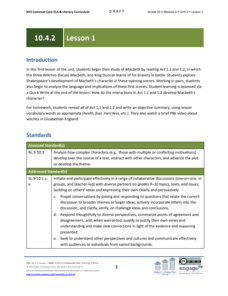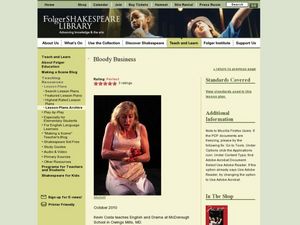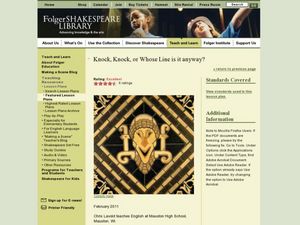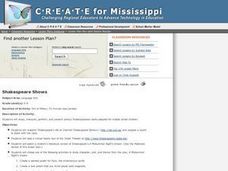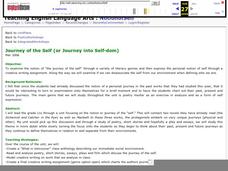Curated OER
Analyzing Atmosphere: Macbeth Murder Scene and Dagger Speech
Shakespeare's Macbeth (Act II, Scenes I and II) lacks explicit details of the murder of King Duncan, yet the author creates an atmosphere that allows us to visualize the event. Readers interpret the "Dagger Speech" by writing stage...
Curated OER
Macbeth: Denouement/Falling Action
Readers of Shakespeare explore denouement in Macbeth and track the play's falling action in Act IV, Scene 1. They complete a worksheet/table noting the content and significance of each of the three apparitions granted Macbeth by the...
Curated OER
Exploring the Expository Scenes in Macbeth
Students examine the function of exposition in play structure. They will be able to develop multiple interpretations and visual and aural production choices for Shakespearean scenes and choose those that are most interesting.
Curated OER
When Shall We Three Meet Again?
Double, double toil and trouble; Fire burn, and caldron bubble. Macbeth’s witches provide young actors an opportunity to try their hand at small ensemble acting. Using Act I, scene I of Shakespeare’s play, groups of three take turns...
Curated OER
Can You Hear Macbeth Now?
Students explore how sound affects scene understanding using the Shakespeare play Macbeth. In this audio and play analysis instructional activity, students respond to Macbeth events as if they were at a sporting event. Students listen to...
Curated OER
When Fair is Foul: Paradox and Equivocation in Macbeth
Pupils read Macbeth for examples of paradox and equivocation in the text. In this literature-response lesson plan, students work in groups to analyze Shakespeare's writing for use of paradox using handouts to guide their search. Student...
Curated OER
The Portrayal of the Witches
Eleventh graders discover the importance of the fortune teller in Shakespeare's Macbeth. After watching two interpretations of the play, they examine and compare the portrayal of the character. They create their own modern adaptation of...
Curated OER
So Foul and Fair a Play
Students watch various interpretations of Shakespeare's Macbeth in film. In groups, they examine the setting, characters, music and sequence. They compare and contrast the various films and discuss the differences. They write an essay on...
EngageNY
Grade 10 ELA Module 4: Unit 2, Lesson 6
What decisions might an author make about the structure of a play? Pupils participate in an evidence-based discussion about Shakespeare's choices in Macbeth. Next, scholars analyze the effect of Shakespeare's structural choices in Act 2,...
EngageNY
Grade 10 ELA Module 4: Unit 2, Lesson 1
What do readers discover about a character within the first few sections of a text? Pupils begin reading Shakespeare's Macbeth and analyze the language in the first few scenes of the play. They also demonstrate understanding with a Quick...
EngageNY
Grade 10 ELA Module 4: Unit 2, Lesson 5
When Macbeth says, "Nature seems dead," he uses personification. Using the resource, scholars complete a Quick Write to analyze the impact of figurative language on the mood of Shakespeare's Macbeth. Pupils also participate in an...
EngageNY
Grade 10 ELA Module 4: Unit 2, Lesson 19
A tragic play includes imperfect heroes, pity and fear, and a fatal flaw. Scholars analyze Shakespeare's Macbeth as an example of the tragedy genre. Pupils demonstrate understanding by completing a Quick Write discussing how Shakespeare...
Curated OER
Macbeth - Analyzing Characterization in Drama
The writing activity in this lesson could be used to assess student understanding of previously taught concepts of how language reveals character.
Curated OER
Hark! The Sounds of Murder
Young scholars analyze the Macbeth murder scene through textual analysis and construct the murder scene of Duncan through the use of sound only. In this Macbeth lesson, students work in groups to analyze the murder scene of Duncan from...
Curated OER
Bloody Business
Students research word frequencies in Macbeth and create a frozen picture inspired by a word. In this Macbeth lesson, students view Blood Will Have Blood and discuss the dual meaning of the word "blood." Students identify five major...
Curated OER
"What are these...?"
High schoolers discuss the "witches" of Shakespeare. In this literature analysis instructional activity, students research the influence of Macbeth's sisters on his behavior. They examine various terms used to describe the sisters, and...
Curated OER
Hamlet Research Paper: Find, Evaluate, and Select Appropriate Research Sources
Help young researchers find credible sources online. Modeling with a Google search for information about Shakespeare’s Macbeth, use a computer projector or Smart Board to show class members how weak the top three search results are....
Curated OER
Macbeth Presentations
Young scholars make Powerpoint presentations or Web pages about Macbeth. Their presentations must include at least three elements from a provided list. They write reflective papers about their learning experience.
Curated OER
Knock, Knock, or Whose Line is it Anyway?
Students compare two versions of Macbeth and participate in improvisational acting. In this improvisational lesson, students read and discuss the text before watching two different versions of the film. Students roleplay a scenario and...
Curated OER
Shakespeare Shows
Students study, interpret, perform, and present various Shakespearean works adapted for middle school Students. They choose a scene from one of the plays covered in this teaching unit to reenact with a group.
Curated OER
Looking at Life through the Creation of Personal Metaphors
Young scholars focus on the creation of personal metaphors, which are first illustrated in pictures and caricatures and then extended to descriptive/analytical paragraphs. They teach the lesson to others using their own personal...
Curated OER
Parodies of Shakespeare
Students view a video clip about parodies. They identify the characteristics of a parody in Mark Twain's work as well. They practice writing Shakepeare like verses.
Curated OER
Journey Into Self
Eleventh graders examine the concept of the journey into self through a variety of literary genres. They express the personal notion of self by creating a picture poem and writing a personal reflection esssay.
Curated OER
An Actor's View of Shakespeare
Students research characters from different plays. In this Shakespeare and performing arts lesson, students discuss the portrayal of characters from the perspective of real actors. Students work in groups to examine the technique for...











